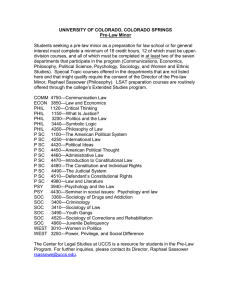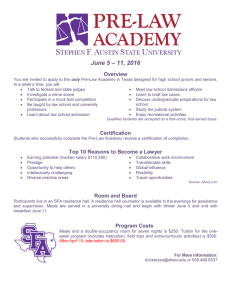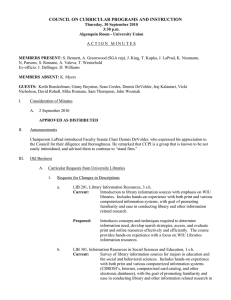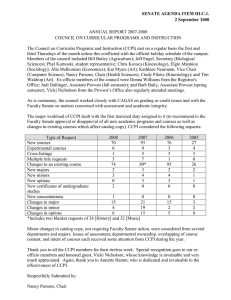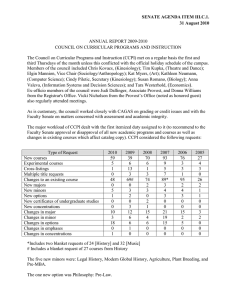COUNCIL ON CURRICULAR PROGRAMS AND INSTRUCTION
advertisement
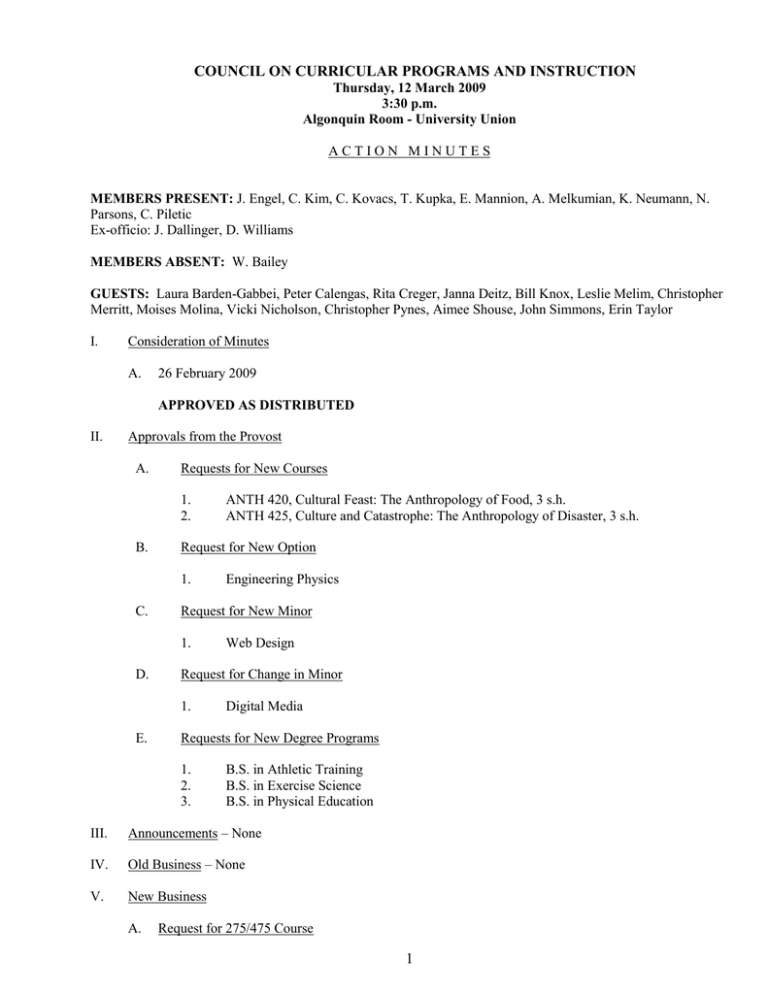
COUNCIL ON CURRICULAR PROGRAMS AND INSTRUCTION Thursday, 12 March 2009 3:30 p.m. Algonquin Room - University Union ACTION MINUTES MEMBERS PRESENT: J. Engel, C. Kim, C. Kovacs, T. Kupka, E. Mannion, A. Melkumian, K. Neumann, N. Parsons, C. Piletic Ex-officio: J. Dallinger, D. Williams MEMBERS ABSENT: W. Bailey GUESTS: Laura Barden-Gabbei, Peter Calengas, Rita Creger, Janna Deitz, Bill Knox, Leslie Melim, Christopher Merritt, Moises Molina, Vicki Nicholson, Christopher Pynes, Aimee Shouse, John Simmons, Erin Taylor I. Consideration of Minutes A. 26 February 2009 APPROVED AS DISTRIBUTED II. Approvals from the Provost A. Requests for New Courses 1. 2. B. Request for New Option 1. C. Web Design Request for Change in Minor 1. E. Engineering Physics Request for New Minor 1. D. ANTH 420, Cultural Feast: The Anthropology of Food, 3 s.h. ANTH 425, Culture and Catastrophe: The Anthropology of Disaster, 3 s.h. Digital Media Requests for New Degree Programs 1. 2. 3. B.S. in Athletic Training B.S. in Exercise Science B.S. in Physical Education III. Announcements – None IV. Old Business – None V. New Business A. Request for 275/475 Course 1 1. POLS 275, Feminism and Political Theory, 3 s.h. NO OBJECTIONS B. Request for Cross-Listing 1. POLS/WS 275, Feminism and Political Theory, 3 s.h. Motion: To approve cross-listing (Melkumian/Kovacs) MOTION APPROVED 7 YES – 0 NO – 0 AB C. Requests for New Courses 1. PHIL 240, LSAT Logic, 1 s.h. Motion: To approve PHIL 240 (Melkumian/Piletic) Dr. Neumann asked if CCPI was being asked to approve academic credit for a test preparation course. She wondered what makes PHIL 240 different from MCAT, GRE, GMAT, or other test prep courses. Philosophy and Religious Studies professor Christopher Pynes responded CCPI is being asked to approve academic credit for the study of logic. He explained that PHIL 240 was developed because each year five to ten students in his PHIL 140 class ask him to help them prepare for the law school admissions test, and another two to five wish to be admitted to the prelaw honors minor. Dr. Pynes devotes a lot of time to providing assistance to these students during his free time on weekends. Dr. Pynes explained that Macomb is geographically isolated from test prep services offered in large cities, so WIU students who wish to go to law school are significantly disadvantaged. He pointed out that this 1 s.h. class is not part of any requirement but is a way to get students the special training they need to be successful. Dr. Pynes stated that 1 s.h. prep courses have been approved before; in those cases, students spend time preparing portfolios. Dr. Neumann asked if Dr. Pynes had looked into offering the course through Non-Credit Programs as this may satisfy students’ needs. He responded he has not investigated this avenue, but he would like to receive ACES for teaching the course since it is quite a time burden on him to do. Philosophy and Religious Studies chair John Simmons said there was some discussion regarding offering the course as a 1 s.h. lab for PHIL 140, Logic and Reasoning, but Philosophy does not generally offer lab courses. Dr. Neumann stated she would still be opposed to offering the course if it were a lab. Dr. Neumann expressed concerns about granting 1 s.h. for test preparation, stating she hesitates to see students receive 1 s.h. toward their graduation from Western by completing this type of course as opposed to any other certification or pre-graduate school type of preparation. Dr. Pynes reiterated that completion of the course, which would be graded S/U, will not satisfy any graduation requirements for students. He asserted the course is more than test prep; is it s logic class. Dr. Neumann countered that the same argument could be made for GMAT or MCAT prep courses. Dr. Parsons pointed out that her department does not offer a prep course for the Health Sciences certification exam; the relevant material is covered in other courses. Dr. Piletic pointed out that approval of this course would set a precedent and could lead to other test prep course requests being submitted. Dr. Pynes explained the course is designed specifically to address the three sections of the law school admissions test that deal with logic arguments and logic reasoning. There are two other sections of the test (reading comp and writing) that Dr. Pynes will not focus on in PHIL 240. Dr. 2 Pynes asserted that the law school admissions test has nothing to do with law school; it is just a cognitive test of how much logic students know, a pure logic exam. He noted this is different than the GMAT, which asks business questions, and the NCAT, which asks questions about the medical field. Dr. Simmons explained the course is a test prep course but at the same time is a course that anyone interested in logic would be drawn to because it teaches a certain kind of logic effective in the legal world. He suggested LSAT could be removed from the title and the course called Intensive Reasoning. In response to a question, Dr. Pynes explained the difference between PHIL 240 and PHIL 140 is that PHIL 140 is a broader course where a lot of time is spent doing things that can later be applied to the LSAT area. Dr. Pynes stated PHIL 140, which is a generalized logic and thinking course, would be a prereq for PHIL 240. Dr. Engel noted that the fact that PHIL 140 would be a prereq for PHIL 240 is consistent with having PHIL 240 as a logic as well as a test prep course. Dr. Engel asked how LSAT preparation is taught at other universities. Dr. Pynes related that when he taught at Florida A&M University, they paid him, though a contract with The Princeton Review, to teach an LSAT review course for their students. He told CCPI that Jamie Hunzinger, who created the Phi Alpha Delta WIU law society, tried to get LSAT test prep companies to come to Macomb with little success. He related one test prep company did come to Macomb because the Phi Alpha Delta fraternity required them to do so, but did a very perfunctory job, offering only one four-hour session. Dr. Pynes reiterated that Western’s students who are serious about studying for the test do not have the access they need to adequately prepare them, adding that his proposed course would not be needed were Macomb near a major metro area. Dr. Neumann asserted students need the same type of prep work for any post-baccalaureate test, and Non-Credit Programs may compensate for teaching such a course. Dr. Pynes asked what is the difference between students receiving credit for doing additional inclass honors work and getting credit for test preparation when the content and work is the same. Dr. Neumann responded it is up to the department chair to determine what an appropriate honors activity might be. Centennial Honors College Director Bill Knox commented he trusts implicitly the work done for in-course honors. He stated by identifying PHIL 240 as a course in logic, higher order thinking skills would be part of the course, and work for honors credit would be performed beyond what is normally assigned. Dr. Kovacs stated he understand the logic component of the course, but explained it is so directed at taking the LSAT that he and others have philosophical disagreements with that type of course offering. He wondered if references to taking the LSAT could be removed from the request and it be presented as a logic class. Dr. Knox suggested that identification of what the course is intended to do could be accomplished through advising. Dr. Pynes asked if the course had a different title but had the exact same focus if it would be approved; Dr. Neumann said this would not necessarily be the case. Dr. Parsons added that the end result would still be that this course is preparing students for an exam versus preparing students for the logical reasoning component of life. She said one of the side benefits of taking logic courses is that it helps students on their professional exams, but they are not promoted as such and are not being approved as preparatory courses offered for credit. She suggested Dr. Pynes look at offering the course through some other means, stating that as long as students have to pay a fee for the course, they will be motivated to take it seriously. Dr. Neumann remarked there is a great need for preparatory course offerings in Macomb, maybe a much broader need than what Dr. Pynes is seeing. Dr. Pynes stated he is not particularly interested in becoming a test prep professor. He said part of the reason PHIL 140 is a prereq for PHIL 240 is that students have to have a lot of the background material before they walk in the door; he would not want students in the class if they have not taken PHIL 140. He told CCPI he is strictly trying to provide a class for honors students, pre-law students, and students in the law society. 3 Dr. Kupka said he would be categorically opposed to granting transfer credits to a student for taking a $500 CPA review exam. He related his son drove three hours each way in order to be prepped logically and philosophically to take the LSAT two years ago. Dr. Kupka asserted it seems clear that individuals on CCPI have attempted to open a window for Dr. Pynes, that they support philosophically what he is trying to do and have tried to show him ways to achieve his goals through the mechanics of the University. Dr. Pynes responded he has heard two suggestions: offer the course through Non-Credit Programs and change the title. Dr. Parsons stated that just changing the title of the course would not be sufficient. MOTION FAILED 0 YES – 9 NO – 0 AB 2. PHIL 440, Legal Reasoning, 3 s.h. Motion: To approve PHIL 440 (Melkumian/Kovacs) Dr. Neumann asked if Philosophy and Religious Studies has faculty qualified to teach the course, remarking it would seem to be beneficial if faculty have some sort of legal background in addition to a reasoning background. Dr. Simmons stated the appropriate faculty are available to teach the course. He pointed out that a Philosophy background is statistically the best preparation for law school. MOTION APPROVED 9 YES – 0 NO – 0 AB 3. UNIV 495, Renewable Energy Capstone, 2 s.h. Motion: To approve UNIV 495 (Melkumian/Piletic) Dr. Neumann asked what kinds of things the program coordinator would look for in approving students for the course. Interdisciplinary Studies program coordinator Rita Creger responded she would verify that students have completed curriculum leading up to this course since it will be offered in the last semester of the proposed new concentrations. Dr. Kupka remarked UNIV 495 will be a very specific capstone course. MOTION APPROVED 9 YES – 0 NO – 0 AB Motion: To move the Geology option change, agenda item E.1., to be considered next (Melkumian/Engel) MOTION APPROVED 9 YES – 0 NO – 0 AB E. Requests for Changes in Options (Reordered) 1. Geology Motion: To approve Geology option (Melkumian/Engel) MOTION APPROVED 9 YES – 0 NO – 0 AB D. Requests for New Options 1. Geology – Earth and Space Sciences Teacher Certification Motion: To approve Geology teacher certification option (Engel/Melkumian) 4 Dr. Barden-Gabbei, who coordinates teacher education for the sciences at WIU, told CCPI there is currently no Geology teacher certification at the state level, so state officials asked that Earth and Space Sciences be included in the title. Dr. Engel asked if this option would draw students away from Biology and Physics. Dr. Barden-Gabbei does not feel it will pull students from these programs; she believes if students want to concentrate on earth and space sciences currently, they are simply not coming to Western or obtaining their WIU degree in Geology and going elsewhere to complete their certification. Dr. Barden-Gabbei does not anticipate a large number of students will be interested in the option because there are not as many earth and space sciences courses offered at the high school level as there are biology courses. She said the number of students in the new option may be comparable to those of Engineering Chemistry or Physics. Changes: Reflect the full title above the chart. In Option category on the chart, move courses under Other to Required Courses Change “Required Courses” to “Special Courses,” and change semester hours to 40-42. Change Open Electives category to Other. MOTION APPROVED WITH CHANGES 9 YES – 0 NO – 0 AB 2. Philosophy – Pre-Law Motion: To approve Pre-Law option (Melkumian/Kovacs) Dr. Parsons pointed out that according to the approved definitions of academic terms, an option core must be 15 s.h., and the proposed core of the Pre-Law option is 10 s.h. Dr. Pynes explained that currently Philosophy and Religious Studies has only one option, Philosophy, and he understood that the cores were to be the same in both the existing and new options. The current Philosophy option has only a 10 s.h. core, so it also would be prevented from becoming an option under the definitions of academic terms. The proposed pre-law option would create a new option but would also de facto create an option out of the existing Philosophy program. Dr. Neumann noted that options are also defined as containing one third to one half the hours of the major, and the new and existing Philosophy options do not meet this definition either. Dr. Simmons asked if his department would need to change the core of the existing Philosophy major to make it 15 s.h. in order for the options to be approved. Dr. Parsons stated CCPI will need to research minutes from meetings where the definitions of academic terms were developed to determine the ruling for grandfathering in existing programs and how that affects new programs developed from them. CCPI discussed possible ways of moving courses from electives into the core in order to achieve the necessary 15 s.h. Ms. Nicholson noted that there are currently no pre-law options in any major in the state of Illinois; she wondered if such an option would attract notice when submitted for approval to the Illinois Board of Higher Education. Ms. Nicholson asked what will happen to the existing preprofessional law program if the pre-law option is approved. Dr. Pynes stated a student could take the Interdisciplinary Minor in Law and Society or the Pre-Law Honors Minor and the proposed pre-law option at the same time; he said the proposed pre-law option will support those programs so they won’t have to be eliminated. Ms. Nicholson pointed out the support letter from Political Sciences indicates they are also developing a pre-law option. She asked if pre-law is a discipline of Philosophy. Dr. Simmons stated that History also plans to proposed its own pre-law option. He explained the College of Arts and Sciences plans to gather pre-law within the college and offer a number of different prelaw areas in which to choose because there are different approaches to the discipline. He said this plan is included in the College’s annual report. Dr. Pynes stated that Philosophy students do the best on LSAT tests and most of them go on to law school. He added that Political Science is the biggest feeder to law schools, so those majors have been targeted by the college to offer pre- 5 law options. Dr. Neumann asked if the University will want pre-law options in three or more distinct disciplines. Motion: To table the pre-law option and charge the CCPI Chair to determine what should occur in regarding to the Philosophy and pre-law options (Neumann/Kovacs) MOTION APPROVED 8 YES – 0 NO – 1 AB Dr. Pynes asked if the determination could be expedited because if the existing Philosophy core will need to be changed, it will need to be submitted to the college curriculum committee. E. Requests for Changes in Options 2. Music Business Motion: To approve Music Business (Melkumian/Kupka) Changes: Put “Same” in the proposed column for Other Requirements and Directed Electives within Option Courses category of chart, and put semester hour totals in appropriate column. MOTION APPROVED WITH CHANGES 9 YES – 0 NO – 0 AB 3. Political Science – General Political Science professor Janna Deitz told CCPI that changes to the Political Science options were desired after the results of assessment from the senior seminar showed students were not taking courses in political institutions. The department wishes to make sure students take these courses in the general and American Government tracks. She said the department was also concerned that there might be an over emphasis on the Public Administration/Public Policy option. Dr. Deitz said this option reflects what was considered the department’s strength several years ago, but the department and the discipline have changed. This option is being streamlined to reflect those changes. She said Public Administration/Public Policy had become so burdensome that students were often not able to complete the option. Dr. Deitz stated that core courses in all options were increased by one 3 s.h. course, and department electives were reduced by one 3 s.h. course, resulting in a common theme to all four options. Dr. Kupka stated he is philosophically opposed to the options, saying they seem to be fostering a narrow focus that is inappropriate in the scheme of liberal arts. 4. 5. 6. Political Science – American Government Political Science – International Relations/Comparative Politics Political Science – Public Administration/Public Policy Motion: To consider the four Political Science options together as a bundle (Kovacs/Piletic) MOTION APPROVED 9 YES – 0 NO – 0 AB Changes: Change core semester hours for each request to 18 (12)* with the asterisk referring to a note at the bottom of each request stating that “Two of POLS 122, 228, 267 may count toward the University General Education Requirement.” Change total proposed semester hours for each to 120. Put “None” in empty boxes under the Proposed column on all requests. POLITICAL SCIENCE OPTIONS APPROVED WITH CHANGES 9 YES – 0 NO – 0 AB 6 F. Requests for New Concentrations 1. Renewable Energy and Biofuels Technology Motion: To approve Renewable Energy and Biofuels Technology (Melkumian/Kupka) When asked how many concentrations are currently offered by Interdisciplinary Studies, Ms. Creger responded the degree offers one option currently, Youth Development. Ms. Nicholson asked if the department had considered one concentration in Renewable Energy with three emphases, but it was noted that emphases are not transcripted, and the three concentrations are quite different. Ms. Creger pointed out that four classes are 4 s.h. or 5 s.h., so the department is requesting a waiver of the 47 maximum semester hours for concentrations. Dr. Neumann asked how the determination was made as to which courses to include in the Concentration category and which to include in the Other category. Ms. Creger responded the courses in the Other category are in general prerequisites for the courses included in the Concentration category. Ms. Williams noted that all courses in the Concentration category will count toward the GPA for the concentration. Dr. Neumann remarked that the department has gone through a process to determine what needs to be included in the Concentration category, and she is opposed to moving courses out just to be moving them. Ms. Nicholson asked why the Open Electives category specifies “To be selected in consultation with the Interdisciplinary Studies advisor” since normally students can take whatever open electives they wish. Ms. Creger responded that specific Open Electives courses are not required, but the Interdisciplinary Studies advisor could encourage students to consider courses that are felt to be beneficial to them. Changes: Change GEOG 140 in Concentration Courses category to GEOG 100 and put a pound sign (#) beside it to indicate that it is a WID course. Move CHEM 201 from Concentration Courses to Other because it is a prerequisite for CHEM 202. Change total semester hours for the Concentration category to 47 with a footnote that 44 s.h. are not counted in Gen Ed. Change total semester hours for the Other category to 29 with a footnote that 9 s.h. are not counted in Gen Ed. Remove the statement that Open Electives are to be selected in consultation with the Interdisciplinary Studies advisor. Change total semester hours for Open Electives to 17. MOTION APPROVED WITH CHANGES 8 YES – 0 NO – 0 AB 2. Renewable Energy and Wind Technology Motion: To approve Renewable Energy and Wind Technology (Kovacs/Engel) When considering the second concentration, CCPI noticed that the WID course for each concentration had not been included in the total semester hours counted for the Concentration Courses; thus, each concentration would still exceed the 47 s.h. maximum for a concentration, despite the changes made to bring the previous concentration (Renewable Energy and Biofuels Technology) into compliance. Dr. Piletic stated that allowing the three concentrations to exceed the 47 s.h. limit established for this category would “open a door” and ventured the department should try to meet the semester hour guideline. Dr. Neumann noted that the concentration category was created specifically for and can only be utilized by Interdisciplinary Studies, and for 7 three concentrations to exceed the guideline requirements and only the one existing concentration to be within the maximum allowable semester hours would not be advisable. Associate Provost Dallinger suggested CCPI could consider changing the rules for concentrations to extend the semester hour range; Dr. Parsons responded that would be a different discussion issue for another time. Ms. Creger noted that if courses are moved from the Concentration to the Other category, and existing course removed from Other, it would mean that necessary prereqs would be hidden. Dr. Kim noted that in Music some programs have to hide their prerequisites because otherwise they would exceed semester hour standards. Dr. Parsons said she would rather see the prerequisites included because it is more transparent and “truth in advertising.” Dr. Kovacs stated that making suggestions at the table as to how to move courses in the concentration to meet required semester hours may not be the best approach; he suggested tabling the concentrations so that the department could take a closer look at how to move things around on the request form. Dr. Kupka remarked that since all of the courses in the Concentration and Other categories are required, it would make sense to begin the explanation of Interdisciplinary Studies in the undergraduate catalog with a straight-forward and clear statement about the fact that these are highly specialized programs that contain basically an inordinate number of specific requirements with no latitude for flexibility. CCPI discussed ways Interdisciplinary Studies could meet the guidelines; the discussion included questions of Gen Ed/directed Gen Ed and visibility of prerequisite courses. Motion: To undo approval of the Renewable Energy and Biofuels Technology concentration and for it be reconsidered (Piletic/Neumann) MOTION APPROVED 8 YES – 0 NO – 0 AB Motion: To table consideration of the three concentrations (Engel/Kim) MOTION APPROVED 8 YES – 0 NO – 0 AB 3. Renewable Energy Policy, Planning, and Management TABLED VI. Reports A. Provost’s Report – None CCPI discussed the draft letter to Provost Thomas prepared by the Recording Secretary from discussions at CCPI regarding the housing of International Studies curricula. The Recording Secretary will work with the CCPI Chair to incorporate suggestions from the meeting and emailed feedback before mailing it to the Provost. Motion: To adjourn (Kupka) The Council adjourned at 5:15 p.m. Jeff Engel, Secretary Annette Hamm, Faculty Senate Recording Secretary 8
